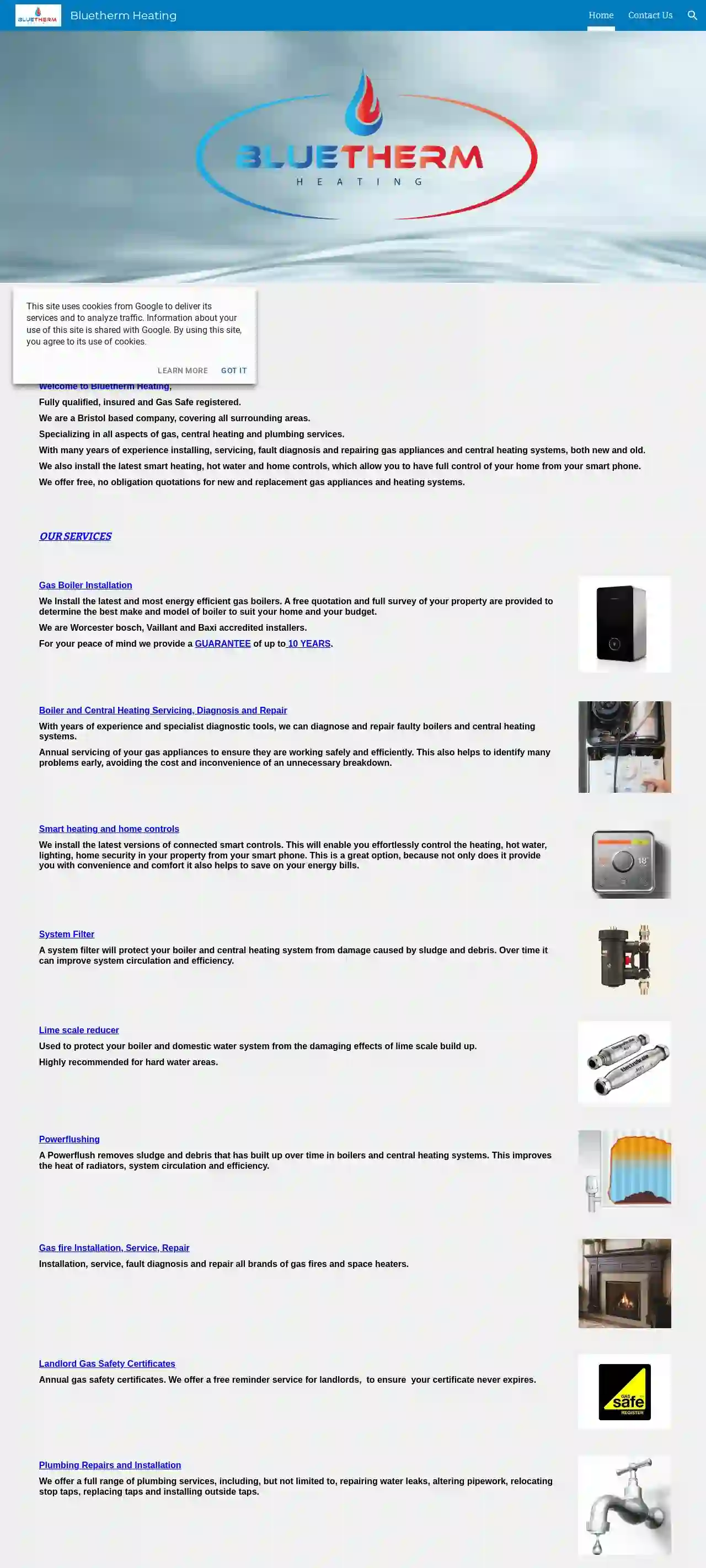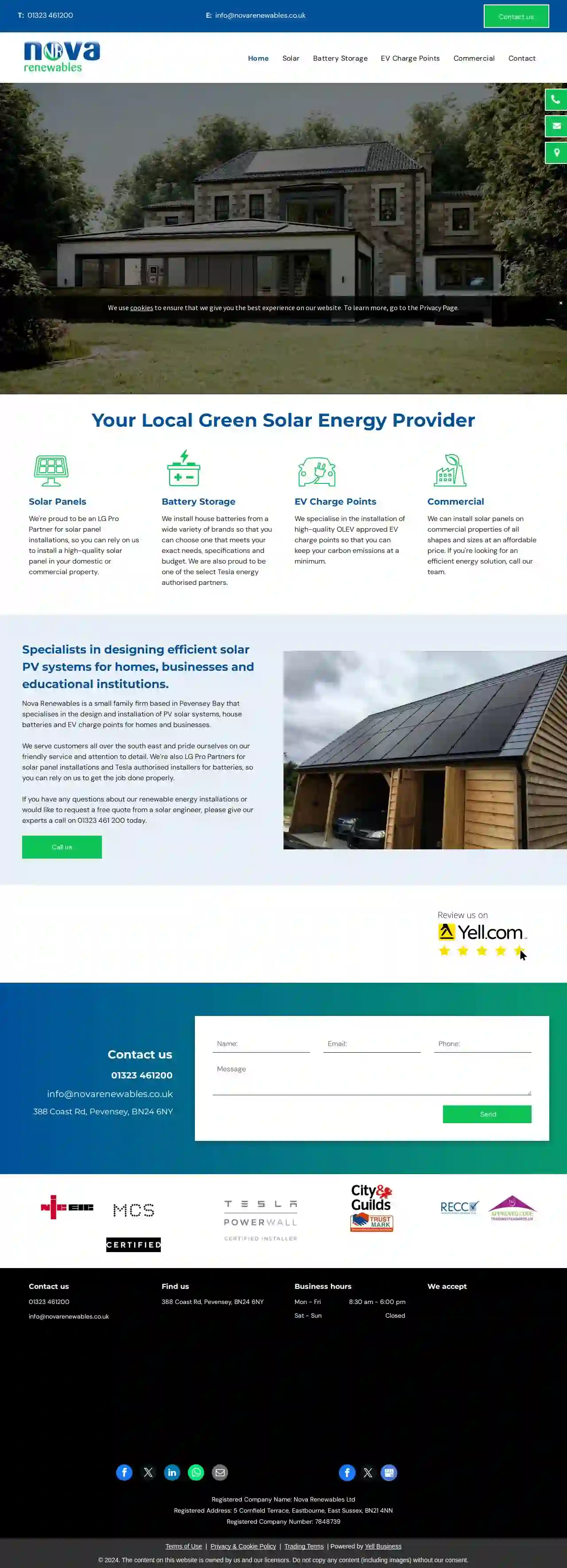Solar Installers Cuckfield
Find the best Solar Installer in Cuckfield
Receive up to 3 Solar Installers quotes for your project today! Compare profiles, reviews, accreditations, portfolio, etc... and choose the best offer.

CRG Direct Solar Limited
512 reviewsBrighton, GBCRG Direct Solar is a family-run, independent business based in the South Coast, dedicated to providing high-quality solar panel installation services. We are proud to be MCS accredited, HIES accredited, and more, ensuring our customers receive the best possible service and products. Our team of 5-star expert technicians are committed to delivering exceptional results, helping you reduce your energy bills and make the switch to a sustainable future. We offer a range of services, including home solar installation, battery installation, commercial solar installations, air conditioning installation, and EV charger installation. We understand that each client has unique needs, so we provide bespoke quotes and tailored solutions to maximize your return on investment. Our equipment is all MCS certified, top of the range, and often features leading warranty assurances. Our panels are guaranteed for upwards of 25 years, and our batteries are guaranteed for upwards of 10 years. We pride ourselves on our quality products, customer service standards, and commitment to providing a seamless experience for our clients. Whether you're looking for a reliable, high-quality solar installation or a more integrated package with additional services, CRG Direct Solar is your trusted local choice.
- Services
- Why Us?
- Accreditations
- Gallery
Get Quote
Large Scale Solar
Hampton, GBAt Large Scale Solar, we specialise in providing solar panels and battery storage solutions to larger buildings. Our solutions are well suited to any of the following areas: Industrial Buildings, Large industrial buildings are optimal for roof mounted solar panel systems. When combined with battery storage, savings can be in excess of £5 million. Ground Arrays, Ground solar panel installations are ideal to maximise energy generation up to megawatt scale with a low risk. Long term power purchase agreements provide security. Farms and Barns, Barns and farm buildings provide a large roof area – perfect for the installation of solar panels. Invest in the future of your roof today. Offices, Why not maximise your offices by investing in your biggest asset – your roof! With energy bills at a premium, start your investment today for huge savings in the future. Healthcare, Hospitals and surgeries are another type of building perfect for large scale solar panels. Become more eco-friendly and go greener with mounted solar panels and battery storage. Manufacturing, Manufacturing warehouses provide large spacious roof to capitalise on. Once you see how much your roof is worth, you’ll want to get involved. Retail Buildings, whilst customers are spending money in-store, you could be saving money by utilising your roof space. You could save millions over the system lifetime. Large Residential, Mitigate a significant portion of your energy costs with Solar PV and Battery Storage. Capitalise on overnight tariffs to complement solar.
- Services
- Why Us?
- Gallery
Get Quote
BlueTherm Solar Energy
Eastbourne, GBWelcome to Bluetherm Heating, Fully qualified, insured and Gas Safe registered. We are a Bristol based company, covering all surrounding areas. Specializing in all aspects of gas, central heating and plumbing services. With many years of experience installing, servicing, fault diagnosis and repairing gas appliances and central heating systems, both new and old. We also install the latest smart heating, hot water and home controls, which allow you to have full control of your home from your smart phone. We offer free, no obligation quotations for new and replacement gas appliances and heating systems.
- Services
- Why Us?
- Gallery
Get Quote
Three Counties Solar
Camberley, Unit F, Kendal Court, Doman Road, GU15 3DF, GBLooking To Make Your Home More Environmentally Friendly? Welcome To Three Counties Solar. Solar power works by converting energy from the sun into usable power. Whether you’re looking to install solar panels onto your home or business or are looking for a solution to charge your electric vehicle, Three Counties Solar will be more than happy to help.Based in Camberley, we have been installing solar panels, EV charging systems, home battery storage and further providing solar panel repairs for many years.To start your journey towards saving money on your energy bills and becoming more energy independent, contact our team today. We’ll be more than happy to discuss your needs and requirements and further help you start generating your own energy. Professional Installation Here at Three Counties Solar, we have worked for many years to build our reputation across our local area as trusted local installers. We’re committed to our customers and ensuring that we provide nothing but quality service that our customers can trust and rely on to last over the years.As solar specialists, we have helped many residential and commercial clients alike, across a variety of sectors.When you work with our team, we’ll help you to make an informed choice on the right system for you, with honest predictions on your home’s energy capabilities. Invest In a Brighter Future: Switch To Solar Energy Today Each and every homeowner is as individual as their home, which is why we’ll make sure that you receive a solar power system that suits you and your lifestyle.No matter what the size of the project at hand, we’ll make sure that your switch to solar energy is as smooth as possible. We’ll assess the best way of installing your new system, and find the best method to go ahead with. What’s more, we understand that you need to choose an installer that you can trust to carry out work on your home, which is why our team will endeavour to provide you with nothing but a level of craftsmanship that exceeds expectations time after time.Make sure to contact us to request a quote and further discover the many benefits that solar power could have for you and your property. We’ll be more than happy to answer any questions you may have and provide you with all of the advice you need.
- Services
- Why Us?
- Accreditations
- Gallery
Get Quote
UK Energy Saving Group
G18 Moulton Park Business Centre, Redhouse Road, Moulton Park, Northampton, NN3 6AQ, GBUK Energy Saving Network is a home improvements company specializing in insulation services, particularly in loft spaces. With a focus on reducing energy consumption and promoting sustainability, we offer high-quality insulation solutions tailored to each homeowner's needs. Experience the transformation without the hassle of lengthy renovations. By insulating and upgrading your loft, you'll not only save energy and reduce heating bills but also gain more storage space, maximizing the utility of your home. Book your FREE home energy assessment today! Contact Us Discover the advantages of earthwool loft insulation Enhance your home's comfort and efficiency with mineral wool loft insulation. By choosing this environmentally friendly option, you'll experience numerous benefits:• Improved Energy Efficiency: Mineral wool effectively traps heat, reducing the need for constant heating in colder months and lowering energy bills.• Enhanced Comfort: Keep your home cozy year-round by preventing heat loss during winter and minimizing heat gain in summer, creating a more comfortable living environment.• Soundproofing: Enjoy a quieter home with mineral wool insulation, as it helps dampen sound transmission between rooms and from outside noise sources.• Eco-Friendly: Mineral wool is made from recycled materials and is itself recyclable, making it a sustainable choice that minimizes environmental impact.• Fire Resistance: Protect your home and loved ones with mineral wool's excellent fire-resistant properties, providing added peace of mind. Enquire Today about us Who We Are and what we do UK Energy Saving Network is a home improvements company specializing in insulation services, particularly in loft spaces. With a focus on reducing energy consumption and promoting sustainability, we offer high-quality insulation solutions tailored to each homeowner's needs.
- Services
- Why Us?
- Accreditations
- Our Team
- Testimonials
- Gallery
Get Quote
G M Monk Renewables
55 reviewsEastbourne, GB- Services
- Why Us?
- Gallery
Get Quote
Nova Renewables Ltd
388 Coast Rd, Pevensey, BN24 6NY, GBNova Renewables is a family-run business based in Pevensey Bay, specializing in the design and installation of PV solar systems, house batteries, and EV charge points for homes and businesses throughout the south east. We pride ourselves on our friendly service and attention to detail, ensuring every project is completed to the highest standard. As LG Pro Partners for solar panel installations and Tesla authorised installers for batteries, you can trust us to deliver quality and reliability. Whether you're looking to reduce your energy bills, embrace a greener lifestyle, or future-proof your property, our team of experts is here to help. Contact us today for a free quote and discover how Nova Renewables can power your sustainable future.
- Services
- Why Us?
- Gallery
Get Quote
Fusion-8
Rockingham Drive, Linford Wood, 18 Linford Forum, Milton Keynes, MK14 6LY, GBFusion8 is a family-run business with over 100 years of combined experience in solar and technology. We are trusted to install solar for EDF Energy, Solar Together, and more. We are accredited by MCS, TrustMark, and the HIES Consumer Code, and are committed to providing you with the best customer service and technical expertise. That's why we're endorsed by Which? and rated 'Excellent' on Trustpilot. We are an installer and a technology company, so we provide solar at a much lower cost than other installers, whilst improving quality – and we pass these savings on to you. We don't cut corners to lower our prices. Our team is made of experienced and passionate solar specialists. We don’t compromise on quality and we go above and beyond industry standards – that’s why we offer a leading 10-year workmanship warranty as standard. We remove the guesswork from solar. Don’t let someone guess the solar system you need. We are the only installer to model every possible system, recommending the best for your home. We crunch over 100,000 data points modelling every possible system size and configuration. Intelligently recommends the optimal system for your home and energy usage. Plan for your future energy needs. View an accurate 3D model of your home. Simply select the solar system that matches your requirements and budget. We only use the best products. Don’t settle for second best. We use Tier 1 solar products providing the best balance of value, performance, and quality. Designer all-black solar panels as standard. Upgradable battery storage. Leading warranties. Solar monitoring smartphone App. Dedicated aftercare from our solar specialists. We make buying solar easy. Access your dedicated Solar Hub to see exactly where you are on your solar journey with real-time updates. Finalise your solar system in minutes including any add-ons. No salespeople and unnecessary home visits. Automatically creates and submits your applications instantly. Access all your documents and certificates. Our dedicated team are always available.
- Services
- Why Us?
- Accreditations
- Gallery
Get Quote
Surrey Solar ltd
58 reviews36 Macdonald Road, Lightwater, GU18 5TN, GBSurrey Solar is a family business based in Lightwater, Surrey, with over 28 years of experience in the electrical industry. We pride ourselves in carrying out Solar PV installations to the highest standard, supplying and fitting the best quality components available on the market. Our team of fully-qualified electricians are BPEC qualified and accredited in Photovoltaic design, installation and commissioning, battery storage, and systems design. We are accredited, certified, and insured for your protection and peace of mind. Our mission is to provide every customer with first-class customer service and the highest level of workmanship, while promoting and facilitating the adoption of renewable energy within homes and businesses.
- Services
- Why Us?
- Accreditations
- Our Team
- Gallery
Get Quote
Vogt Solar Ltd
Eastbourne, GBPowering the energy transition. Our mission is to help create a sustainably better world. Solar Photovoltaic is the First and Best Alternative. We are ib vogt. Sustainability. How we work. Worldwide. Key Strategies. Careers. News. A leading utility-scale solar development platform with a global footprint and a 20-year track record. Our OECD-focused development strategy, world-scale development pipeline, investments in BESS technology, and independent power producer (“IPP”) business model strongly position ib vogt for accelerated near-term growth. Climate change and decarbonising power generation are among the central issues the world is facing today. We, as mankind, are at a historical turning point. Much stands in the balance. The consequences of climate change are likely to be catastrophic for society and we need to rapidly implement solutions – which are by and large available – to combat mankind’s CO2 footprint. How we work. The four pillars of ib vogt’s future success. ib vogt is positioned for sustained growth. Join the team and help us power the energy transition. Solar will become the energy of the future, and the future is now. Are you interested in making a difference in the world? Then begin an exciting career with a team of solar professionals who are changing the world for the better. Career at ib vogt in numbers. Latest news.
- Services
- Why Us?
- Gallery
Get Quote
Over 3,485+ Solar Companies in our network
Our solar experts operate in Cuckfield and beyond!
SolarCompaniesHub has curated and vetted the Best Solar Installers arround Cuckfield. Find a reliable contractor today.
Frequently Asked Questions About Solar Installers
- Contact SolarCompaniesHub: We make it simple to connect with reputable Solar Installers in your area.
- Get Free Quotes: Request free quotes from multiple installers to compare prices, systems, and warranties.
- Schedule a Site Assessment: A qualified installer will visit your property to assess your roof, energy needs, and discuss your goals.
- Review Your Proposal and Contract: Carefully review the proposed system, financing options, and warranties before signing a contract.
- Installation and Activation: Once the contract is signed, the installer will obtain necessary permits, schedule the installation, and activate your solar system.
- Cash Purchase: The most straightforward option, providing the greatest long-term savings but requiring a larger upfront investment.
- Solar Loans: Loans specifically designed for solar installations, often with favorable terms and interest rates.
- Solar Leases: A third-party company owns the system and leases it to you, allowing you to go solar with little or no upfront cost, but you won't own the system or receive tax benefits.
- Power Purchase Agreements (PPAs): Similar to leases, but you pay for the electricity generated by the system, not the system itself.
- Home Equity Loans or Lines of Credit: Borrow against the equity in your home.
What happens if my roof needs to be replaced after I install solar panels?
How do I get started with solar panel installation?
How can I finance my solar panel installation?
How do solar panels work?
What happens if my roof needs to be replaced after I install solar panels?
How do I get started with solar panel installation?
- Contact SolarCompaniesHub: We make it simple to connect with reputable Solar Installers in your area.
- Get Free Quotes: Request free quotes from multiple installers to compare prices, systems, and warranties.
- Schedule a Site Assessment: A qualified installer will visit your property to assess your roof, energy needs, and discuss your goals.
- Review Your Proposal and Contract: Carefully review the proposed system, financing options, and warranties before signing a contract.
- Installation and Activation: Once the contract is signed, the installer will obtain necessary permits, schedule the installation, and activate your solar system.
How can I finance my solar panel installation?
- Cash Purchase: The most straightforward option, providing the greatest long-term savings but requiring a larger upfront investment.
- Solar Loans: Loans specifically designed for solar installations, often with favorable terms and interest rates.
- Solar Leases: A third-party company owns the system and leases it to you, allowing you to go solar with little or no upfront cost, but you won't own the system or receive tax benefits.
- Power Purchase Agreements (PPAs): Similar to leases, but you pay for the electricity generated by the system, not the system itself.
- Home Equity Loans or Lines of Credit: Borrow against the equity in your home.